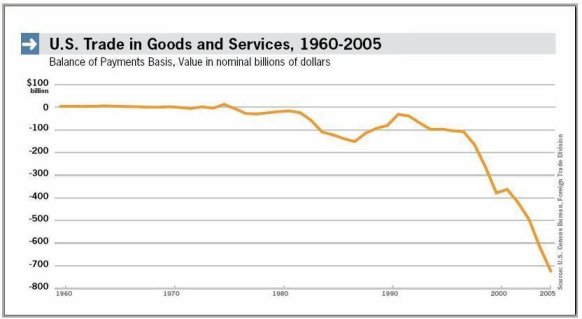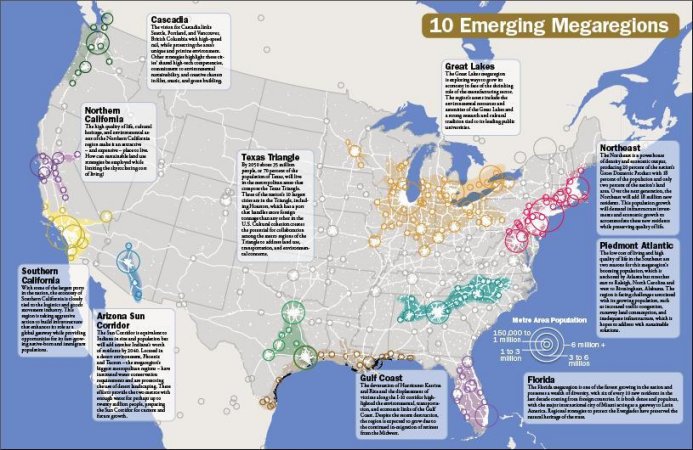Divestiture and Destruction of the U.S.
The political and wealthy elite
in this country have been selling it out from under us since
the 1960's - and they've gotten very, very rich doing it.
Is it any wonder then that they would be implementing a
police state in anticipation of the time - which is fast
approaching - when the declining middle class would figure
out the scam?
xxxxxxxxxxxxxxxxxxxxxxx
Source: American 2050 Prospectus
p.4
"We can hardly
expect the nation-state to make itself superfluous, at
least not overnight. Rather what we must aim for is really
nothing more
than caretakers of a bankrupt international machine which
will have to
be transformed slowly into a new one. The transition will
not be
dramatic, but a gradual one. People will still cling to
national
symbols."
-- Henry Morgenthau
CFR, Secretary of the Treasury under FDR
Source: 1945
|
1974
(TPA has been evolutionary. 1974 seems to be the date of the ‘modern’ variation that is basically a license to steal because Congress doesn't even bother to read the agreements. |
Fast Track Trade Promotion Authority
Succinctly, fast track TPA gives the president the virtually unlimited power of attorney to negotiate trade agreements. In simple terms, this is like giving your neighbor the power of attorney over all of your assets without a clause saying who gets the proceeds from the sale of your assets. DOH! Theoretically, after the president negotiates the agreements, the Congress reads them and then votes - but we know they don’t read anything - they just vote. After all, it’s not their businesses and property that’s being sold. “Background: Fast track is the traditional trade negotiating authority granted by Congress that allows the President to negotiate international trade agreements. Under fast track procedures, the President submits the legislation to Congress for approval or rejection. No amendments are allowed. Congress has ninety legislative days to approve or reject. While congressional and private sector leaders are consulted throughout the negotiations, the final agreement presented as a package assures our trading partners that any solutions they strike with U.S. trade negotiators will not be renegotiated by Congress.” Extracts from the above articles:
|
|
1987 |
Black Monday - Stock Market Crash “OWEN ULLMANN: Not quite with a Fed Chairman, but if you go back to 1987, the stock market crash then, it was triggered by comments that then Treasury Secretary James Baker made about the value of the dollar versus the mark. And a lot of people thought that that statement--“ “In the stock market, the top fifteen sellers on October 19 accounted for 20 percent of the total sales, or $25 billion. Index arbitrage involved about $1.7 billion worth of stock. In the futures market, the concentration of trading among big players was even more significant. Portfolio insurers sold $4 billion worth of stock index futures contracts, which was about 40 percent of the public volume. The top ten sellers accounted for 50 percent of the volume. “Following the 1987 stock market crash, President Reagan called on Mr. [Nicholas] Brady to serve as chairman of the Presidential Task Force on Market Mechanisms. The Brady Commission recommended reforms that were subsequently adopted. The commission recommended the Federal Reserve Board become a ''supercop" overseeing financial market regulation and coordinating ''circuit breakers" such as trading halts on stock and price limits on futures.
|
|
1988 |
Committee on Foreign Investment in the United States (CFIUS) was authorized to review sales of U.S. assets to foreign entities
HISTORY CFIUS includes the following 12 members: the Director of the Office of Science and Technology Policy, the Assistant to the President for National Security Affairs, the Assistant to the President for Economic Policy, Secretaries of Treasury (Chair), State, Defense, Homeland Security and Commerce, the Attorney General, the Director of the Office of Management and Budget, the U.S. Trade Representative, and the Chairman of the Council of Economic Advisers."
|
| 1989 |
“The Brady Plan, the principles of which were first articulated by U.S. Treasury Secretary Nicholas F. Brady in March 1989, was designed to address the so-called LDC debt crisis of the 1980's. The debt crisis began in 1982, when a number of countries, primarily in Latin America, confronted by high interest rates and low commodities prices, admitted their inability to service hundreds of billions of dollars of their commercial bank loans. Because many of these countries' economies were then dependent on commercial bank financing, continued debt reschedulings and the resulting perception of uncreditworthiness led to a "lost decade" of economic stagnation, during which voluntary international credit and capital flows to these nations and their private sectors all but halted. The Brady Plan was very successful in several important respects. First, it allowed the participating countries to negotiate substantial reductions in their overall levels of debt and debt service. Second, it succeeded in diversifying sovereign risk away from commercial bank portfolios more widely throughout the financial and investment communities. Third, it encouraged many Emerging Markets countries to adopt and pursue ambitious economic reform programs. Finally, the Brady Plan has enabled many Emerging Market countries to regain access to the international capital markets for their financing needs.”
“Structural adjustment was the centerpiece of the Baker Plan, which the Reagan administration proclaimed during the IMF-World Bank meeting in Seoul in 1985. World Bank and IMF funds to assist the indebted countries make their interest payments were promised on condition that they adopted 'economic policies along Reaganomic lines - privatization of state enterprises, an end to subsidies, opening the economies to foreign investment.' In the debtors' view, notes Lissakers, 'the proposed reforms ... went much further than the standard IMF nostrums on devaluation, reductions in public-sector borrowing requirement and control over the money supply, and decontrol of wages and prices, ' and were tantamount to 'putting the national patrimony on the block.' They realized that structural adjustment was, as Sheahan describes it, a program that 'was more extreme than anything that could have been seriously considered at the beginning of the 1960s.'” [1]Curriculum Vitae - Nicholas Brady Nicholas Brady, chairman of Darby Overseas Investments, Ltd, was the 68th secretary of the US Department of the Treasury from August 5, 1988 until January 17, 1993. He designed and implemented a strategy to solve the $1.3 trillion less-developed nation debt crisis, which became known as the Brady Plan. Mr. Brady is also credited with containing and resolving the US savings and loan industry crisis through the creation of the Resolution Trust Corporation, for which he served as chairman. Mr. Brady, a career investment banker, joined Dillon, Read & Co. Inc. in 1954 and became its President and Chief Executive Officer in 1971 and the Chairman of the Board in 1974. Following the 1987 stock market crash, President Reagan called on Mr. Brady to serve as chairman of the Presidential Task Force on Market Mechanisms. The Brady Commission recommended reforms that were subsequently adopted. Mr. Brady served on four other Presidential commissions. In 1982, he represented New Jersey in the US Senate. Darby Overseas Investments Ltd. of Washington DC is the parent company of Darby Asia Investors Ltd., which is the Hong Kong-based manager of the $246 million Asian Infrastructure Mezzanine Capital Fund (AIMCF). The Darby group sponsors and manages funds for institutional investors and high-net worth individuals that invest in Latin American private equity (including specialized financial services funds), Latin American and Asian emerging markets' mezzanine finance transactions, and global emerging markets' high-yield-fixed income securities. In addition, Darby sponsors and manages a specialized operating company that provides capital, advisory services, and office facilities to technology firms in Latin America.
|
|
1989 |
Under President George H.W. Bush administration, Under Secretary of State, Ambassador Zoellick assisted in the formation and early years of APEC. APEC is the Asia-Pacific Economic Cooperation trading block. APEC has 21 members: Australia; Brunei Darussalam; Canada; Chile; People's Republic of China; Hong Kong, China; Indonesia; Japan; Republic of Korea; Malaysia; Mexico; New Zealand; Papua New Guinea; Peru; Republic of the Philippines; Russia; Singapore; Chinese Taipei; Thailand; USA; Vietnam.
Source:
Office of the United States Trade
Representative, Press Release, June 1,
2001 Announcing
U.S.T.R. Zoellick to Attend APEC Meeting
in Shanghai, June 6-7 |
| 1992 | George H.W. Bush signed Executive Order 12803 calling for the sell off of U.S. infrastructure assets. This Executive Order was posted in only two places that the research could find. One was on the website of the trade association for the U.S. Water Industry [6]- no doubt because they plan to use the WTO trade agreements to try and force the sale of U.S. water supplies, systems and natural resources. The other website was Cornell University [7]. It's also posted here because Executive Order 12803 should be widely known especially after the Dubai Port debacle. |
This set us up for the dot.con tech boom which was the coup de grâce for our economy
Using Trade to Break our Nation - Treason by Trade
xxxxxxxxxxxxxxxxxxxxxxx
Free Trade Fraud
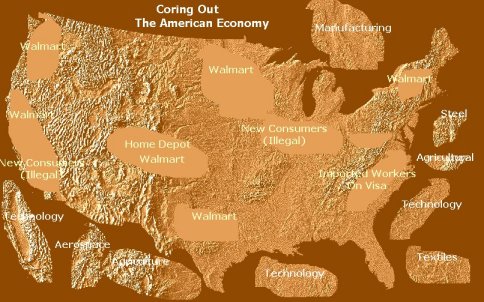
This wasn't bad negotiating. These deals were designed to crush the U.S. economy and transfer the wealth of the American people to the pockets of the elite - Buffet, Rockefeller, Gates, etc. The creation of a global labor pool with as little as 10,000 or so individuals controlling the wealth of the world will set back the clock to the dark ages and feudalism.
As the tax base declined, they just went into deficit spending. No problem right? But they were putting up U.S. property as collateral.
OUR LAND – COLLATERAL FOR THE NATIONAL DEBT
It's not just Americans who have been the victims of the avarice and pathology of the few. In fact, it started in Europe. Europeans have been the victims of deceit as well. The "free trade" plan has been a political plan wrapped in the rhetoric of trade and prosperity for all when it was really designed to destroy nation states.
Human Resource Management
Under a feudal system, peasants can't own property of course and the peasants must be managed like all other beasts of burden. Toward that end, armies of sociologists and systems planners have developed "Human Resource Development" plans for the centrally planned economy.
Human Resource Development Plan - Marc Tucker, NCEE
The United Nations Plan for our Children
Educational Tyranny (all of which have been or are in the process of being implemented)
Regional Economic Development Zones
Land Management
The land use plans call for herding people into "human settlements" and the rewilding of vast amounts of U.S. territory.
Radio Program: "Rural Cleansing and Human Settlements"
Radio Program: "Restructuring America Through Communitarianism"
America 2050 - Prospectus (big pdf)
Megaregions (planned human settlements)
Megaregions Overlaid on International Corridor Map
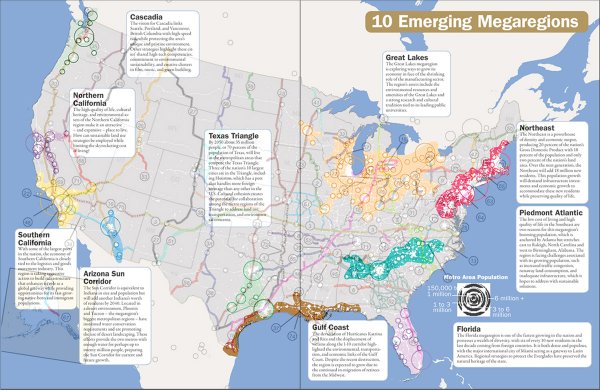
Biodiversity Map - Red Zones to be rewilded
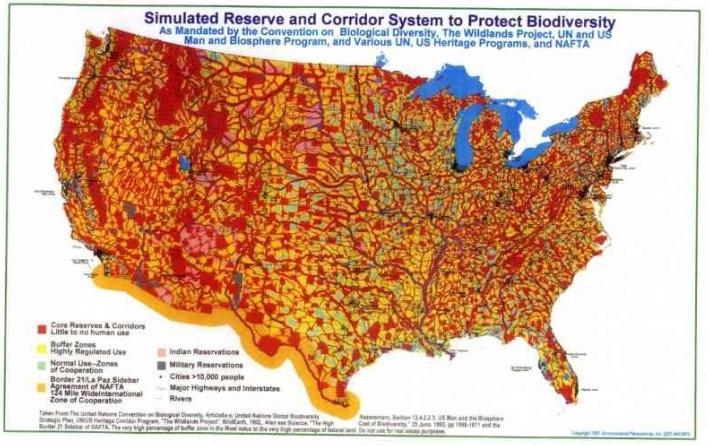

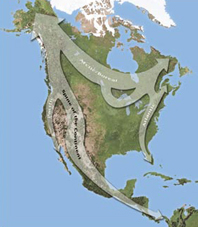
October 13, 2007
